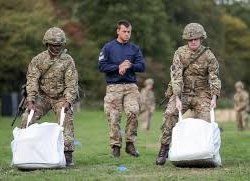It’s the first time in 20 years its been changed – the army says the tests are now harder.
According to an army spokesperson, “These new physical fitness standards are objective, measurable, role-related and gender-free to ensure Army personnel have the physical capability to meet the necessary force preparation and operational requirements.”
Physical Employment Standards (PES) will be incorporated into a new structured suite of Army Role Fitness Tests in 2019 – a series of tests to assess whether personnel are fit for a specific role. The new tests aim to replicate combat scenarios by mimicking real-life tasks. Tests will include casualty extraction from a vehicle, repeated lift and carry and fire and manoeuvre. The standards are based on detailed analysis of roles, with the scientific research being conducted by the University of Chichester.
Under the new system soldiers will have to do a 4km march carrying 40kg of equipment in less than 40 minutes, followed by a 2km march carrying 25kg of equipment in under 15 minutes. Soldiers will then have to complete a fire and move exercise in less than five minutes, followed by a 20m drag of a 110kg weight.
They will then have to carry two water cans weighing 22kg each over 240m in under four minutes, followed by lifting a 70kg weight and holding it for three seconds. Finally soldiers will have to carry bags weighing 20kg 20 times over a distance of 30m.
Why change now? Well, three years ago, statistics released under Freedom of Information rules revealed more than 2,400 forces personnel had failed their annual fitness test, including 7.5 per cent of the Army. Figures also showed that almost 10,000 forces personnel had a body mass index of more than 30, officially classing them as obese.
Unlike the PFA, the new fitness testing regime will not make allowances for someone’s gender or age.
Announcing the new tests earlier this month, Field Army Sergeant Major Gavin Paton said: ‘I don’t care if you are a man or a woman. I don’t care what you do, and the enemy doesn’t either.’
Sources: ukdefencejournal.org.uk. / bbc.co.uk news
